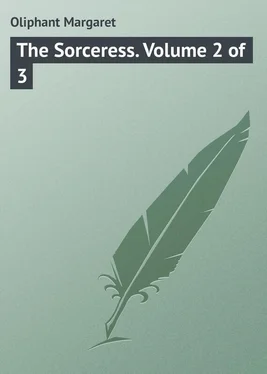Margaret Oliphant - The Sorceress. Volume 2 of 3
Здесь есть возможность читать онлайн «Margaret Oliphant - The Sorceress. Volume 2 of 3» — ознакомительный отрывок электронной книги совершенно бесплатно, а после прочтения отрывка купить полную версию. В некоторых случаях можно слушать аудио, скачать через торрент в формате fb2 и присутствует краткое содержание. Жанр: foreign_prose, на английском языке. Описание произведения, (предисловие) а так же отзывы посетителей доступны на портале библиотеки ЛибКат.
- Название:The Sorceress. Volume 2 of 3
- Автор:
- Жанр:
- Год:неизвестен
- ISBN:нет данных
- Рейтинг книги:4 / 5. Голосов: 1
-
Избранное:Добавить в избранное
- Отзывы:
-
Ваша оценка:
- 80
- 1
- 2
- 3
- 4
- 5
The Sorceress. Volume 2 of 3: краткое содержание, описание и аннотация
Предлагаем к чтению аннотацию, описание, краткое содержание или предисловие (зависит от того, что написал сам автор книги «The Sorceress. Volume 2 of 3»). Если вы не нашли необходимую информацию о книге — напишите в комментариях, мы постараемся отыскать её.
The Sorceress. Volume 2 of 3 — читать онлайн ознакомительный отрывок
Ниже представлен текст книги, разбитый по страницам. Система сохранения места последней прочитанной страницы, позволяет с удобством читать онлайн бесплатно книгу «The Sorceress. Volume 2 of 3», без необходимости каждый раз заново искать на чём Вы остановились. Поставьте закладку, и сможете в любой момент перейти на страницу, на которой закончили чтение.
Интервал:
Закладка:
“Mamma, mamma!”
“Don’t be frightened,” said Mrs. Kingsward, drawing the girl close to her. “That’s a secret; he doesn’t think I know. It would be a curious, curious thing, when people think you are only ill to go and die. It would surprise them so. And so strange altogether – instead of worries, you know, every day, to be all by yourself, lying so easy and the angels carrying you. No trouble at all then to think whether he would be pleased – or anything; giving yourself to be carried like that, like a little child.”
“But mamma,” cried Bee, “you could not, would not leave us – you wouldn’t, would you, mamma? – all the children, and me; and I with nobody else, no one to care for me. You couldn’t, mother, leave us; you wouldn’t! Say you wouldn’t! Oh! Moulsey! Moulsey! look how far away she is looking, as if she didn’t see you and me!”
“You forget, Bee,” said Mrs. Kingsward, “How easy it looked for that saint in the picture. I always liked to watch the birds floating down on the wind, never moving their wings. That’s what seems no trouble, so easy; not too hot nor too cold, nor tiring, neither to the breath nor anything. I shouldn’t like to leave you. No – But then:” she added, with a smile, “I should not require to leave you. I’d – I’d – What was I saying? Moulsey, will you please give me some – more – ”
She held out her hand again for the glass which Moulsey had just put down.
“It makes me strong – it makes me speak. I’m – sinking away again, Bee. Hold me – hold me tight. If I was to slip away – down – down – down to the cellars or somewhere.” The feeble laugh was dreadful for the listeners to hear.
“Run,” cried Moulsey, in Bee’s ear, “the doctor – the doctor! in the library.”
And then there was a strange phantasmagoria that seemed to fill the night, one scene melting into another. The doctor rousing from his doze, his measured step coming back; the little struggle round the bed; Moulsey giving place to the still darker shadow; the glow of Mrs. Kingsward’s flushed and feverish countenance between; then the quiet, and then again sleep – sleep broken by feeble movements, by the quick panting of the breath.
“She’ll be easier now,” the doctor said. “You must go to bed, my dear young lady. Moulsey can manage for the rest of the night.”
“Doctor,” said Bee, with something in her throat that stopped the words, “doctor – will she – must she? Oh, doctor, say that is not what it means? One of us, it would not matter, but mother – mother!”
“It is not in our hands,” the doctor said. “It is not much we can do. Don’t look at me as if I were God. It is little, little I can do.”
“They say,” cried poor Bee, “that you can do anything. It is when there is no doctor, no nurse that people – Oh, my mother – my mother! Doctor, don’t let it be.”
“You are but a child,” said the doctor, patting her kindly on the shoulder, “you’ve not forgotten how to say your prayers. That’s the only thing for you to do. Those that say such things of doctors know very little. We stand and look on. Say your prayers, little girl – if they do her no good, they’ll do you good. And now she’ll have a little sleep.”
Bee caught him by the arm. “Sleep,” she said, looking at him suspiciously. “Sleep?”
“Yes, sleep – that may give her strength for another day. Oh, ask no more, child. Life is not mine to give.”
What a night! Out of doors it was moonlight as serene as heaven – the moon departing in the west, and another faint light that was day coming on the other side, and the first birds beginning to stir in the branches; but not even baby moving in the house. All fast asleep, safe as if trouble never was, as if death could not be. Bee went upstairs to her chill, white room, where the white bed, unoccupied, looked to her like death itself – all cold, dreadful, full of suggestion. Bee’s heart was more heavy than could be told. She had nothing to fall back upon, no secret strength to uphold her. She had forgotten how wretched she had been, but she felt it, nevertheless, behind the present anguish. Nevertheless, she was only nineteen, and when she flung herself down to cry upon her white pillow – only to cry, to get her passion out – beneficent nature took hold of the girl and made her sleep. She did not wake for hours. Was it beneficent? For when she was roused by the opening of the door and sat up in her bed, and found herself still dressed in her evening frock, with her little necklace round her throat, there pressed back upon Bee such a flood of misery and trouble as she thought did not exist in the world.
“Miss Bee, Miss Bee! Master’s come home. He’s been travelling all night – and I dare not disturb Mrs. Moulsey in Missis’s room; and he wants to see you this minit, please. Oh, come, come, quick, and don’t keep the Colonel waiting,” the woman said.
Half awakened, but wholly miserable, Bee sprang up and rushed downstairs to her father. He came forward to meet her at the door, frowning and pale.
“What is this I hear?” he said. “What have you been doing to upset your mother? She was well enough when I went away. What have you been doing to your mother? You children are the plague of our lives!”
CHAPTER III
The week passed in the sombre hurry yet tedium of a house lying under the shadow of death – that period during which when it is night we long for morning, and when it is morning we long for night, hoping always for the hope that never comes, trembling to mark the progress which does go on silently towards the end.
Colonel Kingsward was rough and angry with Bee that first morning, to her consternation and dismay. She had never been the object of her father’s anger before, and this hasty and imperious questioning seemed to take all power of reply out of her. “What had she been doing to her mother?” She! to her mother! Bee was too much frightened by his threatening look, the cloud on his face, the fire in his eyes, to say anything. Her mind ran hurriedly over all that had happened, and that last terrible visit, which had changed the whole aspect of the earth to herself. But it was to herself that this stroke of misfortune had come, and not to her mother. A gleam of answering anger came into Bee’s eyes, sombre with the unhappiness which had been pushed aside by more immediate suffering, yet was still there like a black background, to frame whatever other miseries might come after. As for Colonel Kingsward, it was to him, as to so many men, a relief to blame somebody for the trouble which was unbearable. The blow was approaching which he had never allowed himself to believe in. He had blamed his wife instinctively, involuntarily, at the first hearing of every inconvenience in life; and it had helped to accustom him to the annoyance to think that it was her fault. He had done so in what he called this unfortunate business of Bee’s, concluding that but for Mrs. Kingsward’s weakness, Mr. Aubrey Leigh and his affairs would never have become of any importance to the family. He had blamed her, too, and greatly, for that weakening of health which he had so persistently endeavoured to convince himself did not mean half so much as the doctors said. Women are so idiotic in these respects. They will insist on wearing muslin and lace when they ought to wear flannel. They will put on evening dresses when they ought to be clothed warmly to the throat, and shoes made of paper when they ought to be solidly and stoutly shod, quite indifferent to the trouble and anxiety they may cause to their family. And now that Mrs. Kingsward’s state had got beyond the possibility of reproach, he turned upon his daughter. It must be her fault. Her mother had been better or he should not have left her. The quiet of the country was doing her good; if she had not been agitated all would have been well. But Bee, with all her declarations of devotion to her mother; Bee, the eldest, who ought to have had some sense; Bee had brought on this trumpery love business to overset the delicate equilibrium which he himself, a man with affairs so much more important in hand, had refrained from disturbing. It did him a little good, unhappy and anxious as he was, to pour out his wrath upon Bee. And she did not reply. She did not shed tears, as her mother had weakly done in similar circumstances, or attempt excuses. Even if he had been sufficiently at leisure to note it, an answering fire awoke in Bee’s eyes. He had not leisure to note, but he perceived it all the same.
Читать дальшеИнтервал:
Закладка:
Похожие книги на «The Sorceress. Volume 2 of 3»
Представляем Вашему вниманию похожие книги на «The Sorceress. Volume 2 of 3» списком для выбора. Мы отобрали схожую по названию и смыслу литературу в надежде предоставить читателям больше вариантов отыскать новые, интересные, ещё непрочитанные произведения.
Обсуждение, отзывы о книге «The Sorceress. Volume 2 of 3» и просто собственные мнения читателей. Оставьте ваши комментарии, напишите, что Вы думаете о произведении, его смысле или главных героях. Укажите что конкретно понравилось, а что нет, и почему Вы так считаете.












